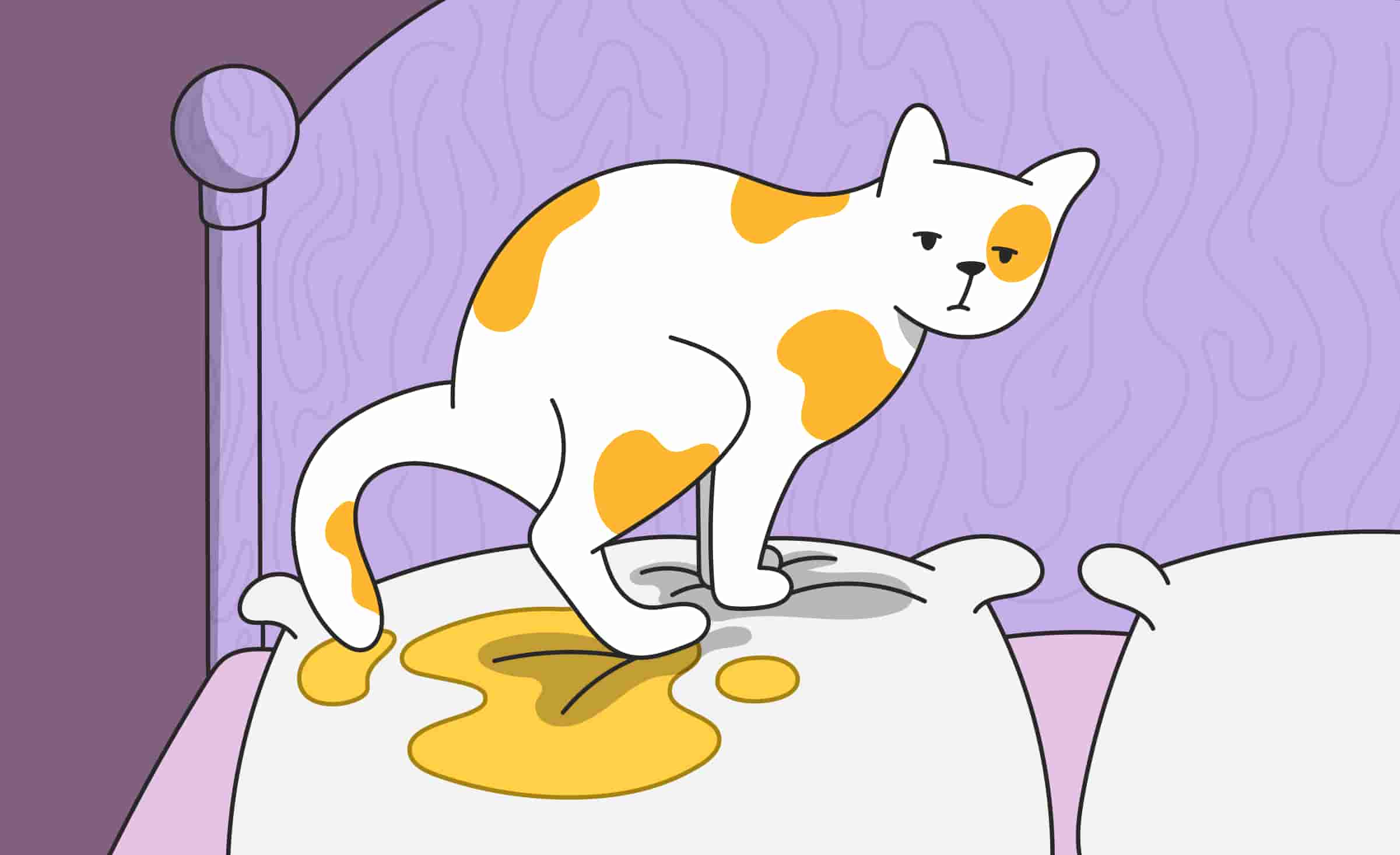
Is your cat peeing on your bed? This behavior can be frustrating and confusing for pet owners.
Understanding why your cat chooses this spot is important. Cats communicate through their actions, and urinating outside the litter box can signal various issues. It could be a sign of stress, health problems, or territorial marking. Each cat is unique, so the reasons may differ.
As a cat owner, you need to identify the cause to address it effectively. In this blog post, we will explore common reasons behind this behavior. We will also offer tips on how to manage the situation. By understanding your cat’s needs, you can create a more harmonious home for both of you.
Introduction To Feline Behavior
Cats are very sensitive animals. They have a strong sense of territory. When a cat feels stressed or unsafe, it may act out. Peeing on the bed can be a sign of this. Your bed may smell like you. This makes it a safe spot for your cat.
Sometimes, cats mark their territory. They use urine to show who owns what space. Changes in the home can cause stress. New pets, loud noises, or moving furniture can upset them.
Understanding a cat’s emotional life is important. Cats need love and attention. A happy cat is less likely to have issues. Spend time with your cat daily. Play and cuddle to build a strong bond.

Credit: petcube.com
Common Reasons For Inappropriate Urination
There are medical conditions that can cause inappropriate urination. Urinary tract infections are common. They make cats feel pain and urgency. Kidney disease can also lead to this problem. It may cause more frequent urination.
Diabetes is another reason for increased urination. It can make cats drink more water. Bladder stones can also hurt and cause accidents. Always consult a vet for these issues.
Behavioral triggers play a big role too. Stress can make a cat act out. Changes in the home, like new pets or moving, can upset them. Litter box problems are also common. A dirty box can make cats refuse to use it.
Territory marking is another reason. Cats may feel the need to claim their space. Understanding these reasons can help you find a solution.
The Role Of Stress In Cats
Stress can affect cats greatly. It may lead to unwanted behaviors. Identifying stress in your cat is essential. Look for signs like hiding, aggression, or changes in appetite.
Common sources of feline stress include:
- New pets in the home
- Changes in routine
- Loud noises or construction
- New family members
- Health issues or pain
Understanding these factors can help you support your cat. Creating a calm environment is important for their well-being.
Litter Box Issues
Proper litter box management is key. Keep the box clean. Scoop it daily. Change the litter often. Cats are picky. They prefer a clean spot.
Choosing the right litter matters. Some cats like clumping litter. Others may prefer non-clumping types. Test different options to find what your cat likes.
Consider the box size. It should be big enough for your cat. Also, place the box in a quiet area. Too much noise can scare them.
Lastly, avoid strong scents. Many cats dislike strong odors. Unscented litter is usually a safe choice.
Territorial Marking Explained
Understanding territorial behaviors is key to knowing why your cat pees on your bed. Cats often mark their territory. This behavior helps them feel secure. They use scent to communicate with other cats.
Each cat has its own style of marking. Some may scratch, while others may spray. A cat’s urine carries strong scents. This signals to other cats that this space is claimed.
When dealing with multiple cats, problems can arise. One cat may feel threatened by another. This can lead to more marking behaviors. Keep your home calm and safe for all cats. Providing enough resources, like litter boxes, can help.
Cleaning And Removing Stains
Cleaning cat pee can be tricky. Start by using paper towels to soak up the liquid. Press down gently. Then, use a mixture of water and mild soap. Rinse the area well. Dry it with a clean towel.
For tough stains, try vinegar and water. Mix one part vinegar with two parts water. Spray it on the spot and wipe it up. This helps remove odors too.
To prevent your cat from peeing again, use special cleaning products. Look for enzyme cleaners. They break down the stains and smells. Cats may return to spots that smell like urine.
Some products can help deter repeat offenses. Try using sprays that cats dislike. Citrus scents often work well. Keep the area clean and fresh.
Behavioral Modification Techniques
Positive reinforcement helps teach your cat good habits. Reward your cat for using the litter box. Use treats or praise when they do it right.
Creating a comforting environment is important. Make sure your cat feels safe. Provide cozy spots and quiet areas for them. Keep the litter box clean and in a good location. This will encourage your cat to use it.
Be patient with your cat. Change takes time. Show love and understanding. This will help your cat feel secure. A happy cat is less likely to have problems.
When To Consult A Professional
Consult a vet if your cat pees on the bed. It can show health problems. Common issues include urinary tract infections or bladder stones. Early treatment is important.
Behavioral specialists help with cat behavior issues. They understand why cats act out. A specialist can offer solutions to stop this behavior. They can teach you how to train your cat.
Pay attention to your cat’s habits. Note any changes in behavior. This information helps the vet or specialist. They can give the best advice for your cat.
Prevention Strategies
Routine helps your cat feel safe. Set a regular time for feeding. This creates a pattern your cat understands. Consistent playtime also helps. Your cat will feel more relaxed.
Environmental enrichment is key. Provide toys that stimulate your cat’s mind. Scratching posts can keep them happy. A cozy bed in a quiet spot is important. Cats love to explore. Create safe spaces for them to enjoy.

Credit: www.dutch.com
Frequently Asked Questions
Why Is My Cat Suddenly Peeing On My Bed?
Your cat may pee on your bed due to stress, medical issues, or territorial marking. Changes in the environment or litter box preferences can also cause this behavior. Consult a veterinarian to rule out health problems and consider behavioral modifications to address the issue effectively.
How To Punish A Cat For Peeing On Bed?
Do not punish your cat for peeing on the bed. Instead, clean the area thoroughly to remove the scent. Provide a clean litter box and encourage proper bathroom habits. Consult a vet to rule out medical issues if this behavior continues.
What Deters Cats From Peeing On Bed?
To deter cats from peeing on the bed, keep the area clean and scent-free. Provide a litter box nearby. Use pet-safe deterrent sprays. Ensure your cat feels safe and stress-free. Regularly play with your cat to reduce anxiety. Finally, spay or neuter to minimize territorial behaviors.
Do Cats Pee On Your Bed When They Miss You?
Cats may pee on your bed as a sign of stress or anxiety, not necessarily because they miss you. This behavior often indicates a need for attention or a change in their environment. Address any underlying issues to help your cat feel secure and comfortable.
Conclusion
Understanding why your cat is peeing on your bed is essential. It could be stress, health issues, or marking territory. Always check for any signs of illness first. A vet visit can help rule out medical problems. Creating a comfortable space for your cat may reduce anxiety.
Clean any mess thoroughly to remove the scent. Patience is key in addressing this behavior. With attention and care, you can help your cat feel secure. This will lead to happier days for both of you.







